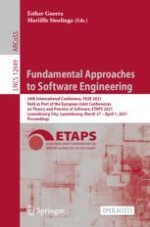Open Access 2021 | Open Access | Buch

Fundamental Approaches to Software Engineering
24th International Conference, FASE 2021, Held as Part of the European Joint Conferences on Theory and Practice of Software, ETAPS 2021, Luxembourg City, Luxembourg, March 27 – April 1, 2021, Proceedings
herausgegeben von: Assoc. Prof. Esther Guerra, Mariëlle Stoelinga
Verlag: Springer International Publishing
Buchreihe : Lecture Notes in Computer Science